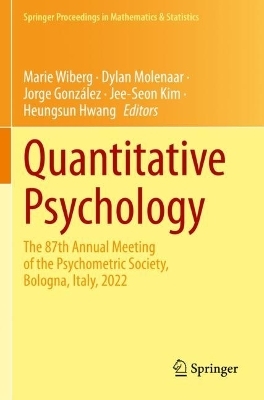
Quantitative Psychology
Springer International Publishing (Verlag)
978-3-031-27783-2 (ISBN)
The volume represents presentations given at the 87th annual meeting of the Psychometric Society, held in Bologna, Italy at July 11-15, 2022. The proceedings cover a diverse set of psychometric topics, including item response theory, Bayesian models, reliability, latent variable models, causal inference, and cognitive diagnostic models.
Marie Wiberg is professor in Statistics with specialty in psychometrics at Umeå University in Sweden. Her research interests include test equating, applied statistics, parametric and nonparametric item response theory, large-scale assessments and educational measurement and psychometrics in general.
Dylan Molenaar is an assistant professor at the department of psychology, University of Amsterdam. His research interests include item response theory, factor analysis, response time modeling, and modeling of intelligence test scores.
Jorge González is an associate professor at the Department of Statistics, Faculty of Mathematics, Pontificia Universidad Católica de Chile, and an associate researcher at the Millennium Nucleus on Intergenerational Mobility: From Modelling to Policy (MOVI). His research is focused on the statistical modeling of data arising from the social sciences, particularly on the fields of test theory, educational measurement and psychometrics. He has conducted research on item response theory (IRT) models, standard settings procedures, structural equation models, value-added models, test equating, identifiability in IRT models, and methods of statistical inference under both the classical and the Bayesian approach.
Jee-Seon Kim is a professor in the Department of Educational Psychology at the University of Wisconsin-Madison. Her research interests are concerned with the development and application of quantitative methods in the social and behavioral sciences, focusing on causal inference, heterogeneous treatment effects, omitted variable bias, multilevel models and clustered data analysis, latent variable and mixture modeling, and causal machine learning methods.
Heungsun Hwang is Professor of Quantitative Psychology at McGill University in Canada. His research is devoted to the development of quantitative analytics tools for examining complex relationships of various data from psychologyand other disciplines toward a better understanding of human behaviour and cognition. Methodologically, he is interested in a wide array of statistical methods in multivariate statistics, structural equation modeling, machine learning, functional data analysis, and genetic and neuroimaging data analysis.
1. Factors Affecting Efficiency of Interrater Reliability Estimates from Planned Missing Data Designs on a Fixed Budget.- 2. Concordance for Large-Scale Assessments.- 3. Comparing Parametric and Nonparametric Methods for Heterogeneous Treatment Effects.- 4. A Historical Perspective on Polytomous Unfolding Models.- 5. Kernel equating presmoothing methods: An empirical study with mixed-format test forms.- 6. Equating different test scores with landmark registration compared to equipercentile equating.- 7. Pauci sed boni: An Item Response Theory approach for shortening tests.- 8. Limited Utility of Small-Variance Priors to Detect Local Misspecification in Bayesian Structural Equation Models.- 9. Proper and Useful Distractors in Multiple-Choice Diagnostic Classification Models.- 10. Detecting latent variable non-normality through the generalized Hausman test.- 11. A Speed-Accuracy Response Model With Conditional Dependence Between Items.- 12. A modified method of balancing attribute coverage in CD-CAT.- 13. Resolving the test fairness paradox by reconciling predictive and measurement invariance.- 14. The Plausibility and Feasibility of Remedies for Evaluating Structural Fit.- 15. Clustering individuals based on multivariate EMA time-series data.- 16. On the relationship between coefficient alpha and closeness between factors and principal components for the multi-factor model.- 17. A Genetic Algorithm-based Framework for Learning Statistical Power Manifold.- 18. Using nonparametric mixture models to model effect heterogeneity in meta-analysis of very rare events.- 19. Investigating Differential Item Functioning via Odds Ratio in Cognitive Diagnosis Models.- 20. Effect of Within-Group Dependency on Fit Statistics in Mokken Scale Analysis in the Presence of Two-Level Test Data.- 21. Regularized Robust Confidence Interval Estimation in Cognitive Diagnostic Models.- 22. Continuation Ratio Model for polytomous responses with censored like latent classes.- 23. A three-step rectangular latent Markov modeling for advising students in self-learning platforms.- 24. Considerations in group differences in missing values.- 25. Fully Latent Principal Stratification: combining PS with model-based measurement models.- 26. Multilevel Reliabilities with Missing Data.- 27. New Flexible Item Response Models for dichotomous responses with applications.- 28. Estimating Individual Dynamic Factor Models Using a Regularized Hybrid Unified Structural Equation Modeling with Latent Variable.- 29. Optimizing Multistage Adaptive Testing Designs for Large-Scale Survey Assessments.- 30. Psychometric modeling of handwriting as a nonverbal assessment instrument and its properties.- 31. Analyzing SpatialResponses: A Comparison of IRT-based Approaches.- 32. Application of the network psychometric framework to measurement burst designs
| Erscheinungsdatum | 18.06.2024 |
|---|---|
| Reihe/Serie | Springer Proceedings in Mathematics & Statistics |
| Zusatzinfo | IX, 381 p. 1 illus. |
| Verlagsort | Cham |
| Sprache | englisch |
| Maße | 155 x 235 mm |
| Themenwelt | Geisteswissenschaften ► Psychologie ► Test in der Psychologie |
| Mathematik / Informatik ► Informatik ► Datenbanken | |
| Mathematik / Informatik ► Mathematik | |
| Schlagworte | Dynamic Models • IMPS 2022 • Item response theory • Measurement • missing data • Psychometrics • response data • structural equation models • test scores |
| ISBN-10 | 3-031-27783-X / 303127783X |
| ISBN-13 | 978-3-031-27783-2 / 9783031277832 |
| Zustand | Neuware |
| Haben Sie eine Frage zum Produkt? |
aus dem Bereich


